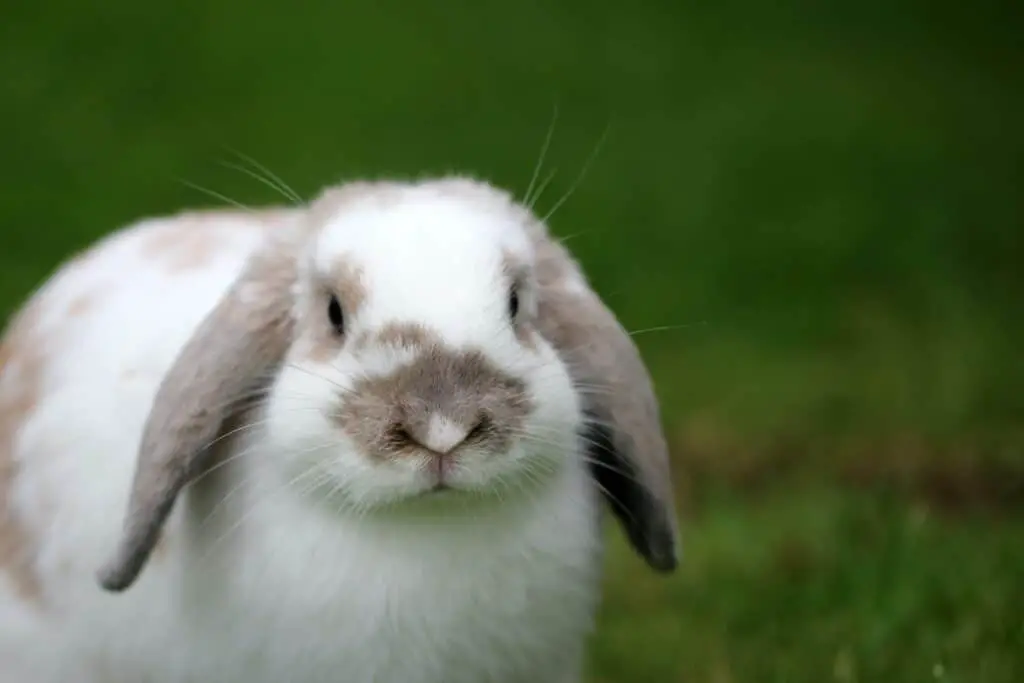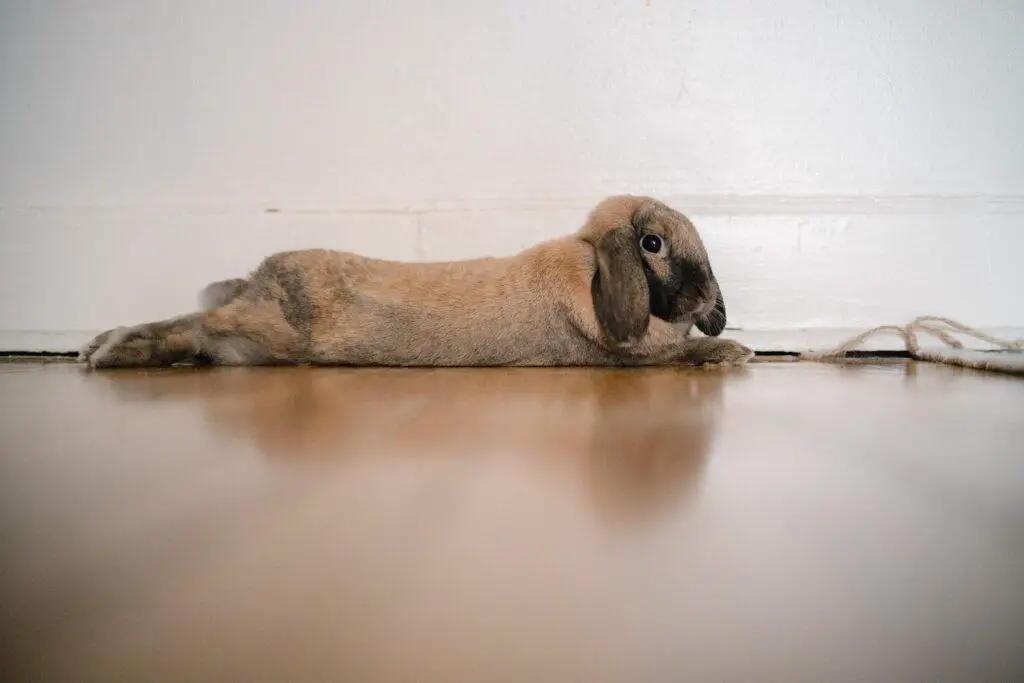
Rabbits are noisy pets. They bustle and hop around, they click, and they even make squeaking noises from time to time. Occasionally, though, you may notice that they’re grunting at you.
Rabbits grunt at their owners for these eight reasons::
- Rabbits can be Territorial
- Your Rabbit Is Excited
- Your Rabbit Feels Threatened
- Your Rabbit Is Angry
- Your Rabbit Is in Pain
- Your Rabbit Wants to Mate
- Your Rabbit May Be Pregnant
- Your Rabbit Is Trying to Get Your Attention
Grunting or growling means many different things with bunnies, and it is typically not a cause for concern. In this article, we’ll explore these eight reasons why your rabbit may be s grunting at you, what it might mean, and when you should be worried.
1. Rabbits can be Territorial
Rabbits will grunt at you if they feel that you’re encroaching on their territory, and they don’t like it. Rabbits often grunt when you first bring them home, before they get to know you. Rabbits grunt because they do not yet know you well, and more than that, they do not yet understand that you are not trying to threaten their territory.
Rabbits will also grunt at each other because they are territorial, especially if both parties are male.
If you notice that your rabbits are grunting at each other over territory, it’s best to separate them before things get physical. Otherwise, one of them could get hurt.
When you see that your rabbit is grunting directly at you when you step onto their territory, there are a few ways to diffuse the situation. Whatever you do, start the process as soon as you notice the behavior before it escalates into further aggression.
Some ways you can diffuse a territorial dispute with your rabbit are:
- Approach slowly. If you enter a rabbit’s territory too fast, they’re more likely to lash out and attack you. Approach slowly and speak softly.
- Bring treats. If you bring the rabbit a treat as you enter its home, she will begin to associate you with a positive experience. Thus, your rabbit will stop thinking of you as a threat to her territory.
- Stay still. Once you get to your rabbit’s enclosure, stand there and don’t move for a few minutes. That way, your rabbit will approach you if she wants to, and she will be able to sniff you out to get to know your scent.
- Back off. Sometimes, you need to walk away and try again later. If you try treats, a slow approach, and standing still and your rabbit is still grunting, it’s not going to get better. At this point, it’s best to try again later when your rabbit is in a better mood.
2. Your Rabbit Is Excited
Once your rabbit does get to know you, the grunting still may not stop in some cases. When you enter your rabbit’s enclosure, she might grunt when she sees you. However, instead of this being a territorial issue, it just means one thing: they are excited to see you! Rabbits may also grunt excitedly when they see that you have food.
If your rabbit is grunting with excitement, you should:
- Speak to them. Just let them hear your voice, preferably in a soft tone, so that they’re continuously getting used to the sound.
- Never make any loud noises. If you make loud noises around your rabbits when they’re excited, you’ll frighten them. Frightening them may cause issues with your attempts to bond with your rabbit.
- Give them attention. Pet them, pick them up gently, or sit down and let them crawl into your lap. Always make sure you’re actively maintaining a positive relationship with your rabbit; it’ll help them feel safe in your care.
3. Your Rabbit Feels Threatened
If you’re trying to approach your rabbit and she starts to grunt, she may feel threatened by your presence.
Rabbits can feel threatened for several reasons:
- She might not be comfortable with you
- You might have walked up too fast
- You might be nervous or a little on edge
If you run upon your rabbit a little too fast, try to slow down and make sure to let her know that it’s you. You can do that by sitting on the ground and letting her come to you. If you’d rather not sit, you can just stand still and let her sniff you out. That will also help her get to be more comfortable with you.
Animals can sense our emotions, sometimes better than we can. If you notice that your rabbit is grunting at you on a particularly bad day, your rabbit is probably picking up on your negative feelings.
Instead of proceeding further, it’s probably best to go cool down before you try again.
Here are some ways that you can make sure that your rabbit is getting only the best, low-stress version of you:
- Handle your rabbits early in the morning. By doing this, you’re taking care of your rabbit before you interact with the world. There’s less of a chance of something happening to upset you earlier in the morning.
- Keep your rabbits in a no-stress zone. If there’s a particular spot in your house where you know you experience a lot of stress, try not to keep your bunny in there. Instead, try putting their habitat in a room that you associate with relaxation. For example, you might want to put her in your den rather than in your office.
- Assess yourself. If you know you’re not in a good mood, hold off on interacting with your bunny. Instead, try going back later or even delegating the responsibilities to someone else for the day.
4. Your Rabbit Is Angry
Just like humans can get in bad moods, rabbits can, too. You might not necessarily be doing anything wrong, but they’re grunting at you anyway. In this case, it’s safe to assume that your rabbit is in a bad mood. This is normal, so as long as they don’t seem like they’re in pain, there’s nothing to worry about.
There are plenty of things that can upset your bunny. Loud noises are a big issue for rabbits and their sensitive ears. Footsteps, screaming, or loud knocking is sure to push their buttons. Rabbits may also be angry because they’re hungry, or if you’re housing multiple rabbits together, they may be angry at each other. However, the world can’t just stop because your bunny is in a bad mood.
To avoid being bitten or kicked by your rabbit, you should take the following precautions:
- Come prepared. One of the best ways to deal with an angry bunny is to offer them food. Try keeping a small handful of their favorite treats in your pocket, so you have something to offer them that might help lighten the mood.
- Come quietly. If it’s a loud noise that has your bunny on edge, then you barging in is certainly not going to help. Instead, enter their area quietly and speak softly so that they know you’re there. Otherwise, you’ll frighten them further and risk being bitten.
5. Your Rabbit Is in Pain

As much as grunting can mean something that isn’t serious, there are times when grunting is an indicator that your rabbit is in pain. You should always inspect your rabbit for injuries when you hear them grunting, though it doesn’t need to be an incredibly thorough inspection. Just glance over their bodies and look for any signs of injury.
How to Spot Injuries on Your Rabbit
There are a few telltale signs that something is wrong with your rabbit. The first is the grunting;
If rabbits are grunting while standing still and they let you approach, something may be wrong.
The best thing to do in this situation is to look your rabbit over for obvious injuries and run your hands over their body.
While you’re running your hands over her body, feel for particularly hot spots. These spots are known as hot limbs, and they’re common in every mammal. When a mammal is injured, their body sends histamines to the area to try to rebuild the injury, resulting in the area heating up as the histamines begin to work.
Hot spots can be indicative of a few things, including:
- A break, fracture, or sprain. You should observe if your rabbit is limping or dragging a limb. Set her down. If your rabbit tries to hop but can’t or one of their limbs drags behind them, it is most likely a break, sprain, or fracture.
- An infection. Infections are common in rabbits, especially with their long, floppy ears. An infection will usually be easier to spot since a rash or pus typically accompanies it.
Regardless of the cause of your rabbit’s pain, the safest thing to do in this situation is to take your bunny to the vet.
From there, the vet will set the limb or prescribe antibiotics for the infection.
Other indicators that your bunny could be injured include:
- Refusal to eat
- Sudden personality changes
- Shivering
- Excessive hiding.
6. Your Rabbit Wants to Mate
Your rabbit may be grunting because she wants to mate. Rabbits reach sexual maturity at around three to six months. So, around this time, you will need to be prepared for some hormonal outbursts. Grunting is a natural part of their mating ritual.
Sexual maturity is when, if you are keeping a male and a female together, rabbits need to be separated. Otherwise, they will breed, and bunnies breed often and at a rapid pace.
Unfortunately, there is not much you can do to stop this grunting other than having your rabbit spayed or neutered. Once this is done, most of the aggressive mating behavior and the grunting should subside.
7. Your Rabbit May Be Pregnant
Maybe you didn’t notice the mating grunts in time, and now your rabbit is pregnant. This is another instance where your rabbit may grunt at you, especially if she feels like you’re a threat to their babies. For example, if you pick up your pregnant rabbit and hold her stomach, she may grunt at you. The same will happen if you touch her stomach while petting her.
Alternatively, your rabbit may also grunt at you once they’ve had their babies. For the first few weeks of life, the mother is in full protective mode and nursing. If you approach her babies or try to take one away, especially while they’re nursing, your rabbit will grunt at you. However, this may escalate further, and if she gets really upset, she may even bite.
There are some ways to avoid both the grunting and a stressed-out pregnant or nursing rabbit mom, such as:
- Creating a distraction. If you need to take away a baby, whether for a check-up or you’ve put it up for sale, it’s a good idea to divert mom’s attention. Do this by bringing another person, and have them offer the rabbit treats while you take the baby or have them take the baby.
- Waiting until she’s asleep. If a rabbit is asleep, chances are, she won’t grunt. You can sneak into her hutch during sleeping hours and steal a baby away. In some cases, you might even be able to get it back before she notices the baby is gone.
- Only using the people she trusts. If you need to pick up a baby or a pregnant rabbit and want to avoid a grunt or a bite, you should always use the person your rabbit trust the most. Rabbits are more likely to realize a person they trust means no harm.
8. Your Rabbit Is Trying to Get Your Attention
The need for attention is a very common reason for grunting in rabbits. Usually, rabbits will grunt while also sitting at your feet. When this happens, you can rest assured that it is 100% your fault; you didn’t give your rabbit the attention she wanted. There is a quick way to remedy grunting in this circumstance.
To give rabbits attention, you have a few options. You can pick your bunny up and give her the pets they deserve, or you can sit and let them crawl into your lap.
Attention-seeking grunts mean that your rabbit wants to spend some time with you, and it usually means you have a pretty strong bond.
Do Rabbits Make Other Noises?
There are a few other noises you’ll probably hear at least once as a rabbit owner. Some of these noises can be made in conjunction with or in place of grunting. It just depends on your rabbit and the type of mood they’re in.
Some sounds your rabbit may make can include:
- Teeth purrs
- Chirping
- Thumping
- Screams or Squeals
Teeth Purrs
One noise they make is called teeth purring. This is similar to when a cat purrs; it just means that your rabbit’s content or happy, mainly when you’re petting them.
Chirping
Similarly, rabbits sometimes cluck, also called chirping. When they do this, it usually means the same as teeth purring. They’re in a good mood, they’re feeling playful, or they’re just excited to see you.
Thumping
Rabbits are also known for thumping. Thumping is when a rabbit stomps its back leg on the ground repeatedly. Thumping is done to alert other rabbits that there may be a threat nearby. Thumping can be and usually is used in conjunction with grunting, so if you notice these noises, always proceed with caution.
Screams or Squeals
Rabbits will also scream and squeal. These sounds are not as versatile as grunting. If your rabbit is screaming or squealing, they are in pain, or they are in danger. These sounds will be heard if they’re fighting with each other or a predator has found its way into their hutch. Whatever the case, if you hear your rabbit screaming, get to them quickly to ensure that they are okay.
Can You Stop Rabbits from Grunting?
Unfortunately, there is no tried-and-true way to get a rabbit to stop grunting. It’s an instinct, and it’ll be very hard, if not impossible, to put a stop to it completely. If your rabbit grunting is genuinely bothersome to you, you may need to reassess your approach.
Some questions you can ask yourself are:
- Were they grunting before you were near?
- How fast are you approaching them?
- Have they eaten today?
- Are they thumping or making other noises?
Sometimes, the problem is you, not an aggressive bunny friend. If you can’t get to the root of the problem, try remembering how you walked in and taking a different, quieter approach next time to see if the situation changes. If so, you’ll know how to approach your rabbit to prevent more grunting in the future.
Should You Use Physical Discipline to Stop Grunting?
When animals make undesirable noises, some owners will use physical discipline to try to eliminate the behavior.
While physically disciplining any animal is typically not the best route to take, it is especially dangerous with rabbits.
Rabbits are small and incredibly sensitive animals. Something as little as a loud noise can frighten them so severely that they die. So, striking, kicking, or pinching a rabbit can have the same impact.
If the act of being physically punished doesn’t kill them, there is still a chance that all of the stress it places on them might. Never physically discipline your rabbit, regardless of grunting.
Conclusion
Rabbits grunt and nothing can be done about it. However, if you want to try to lessen the grunting, you can always approach them slowly, using a calm, soft tone of voice. The secret to only receiving happy grunts from your rabbit is to bond with them.
